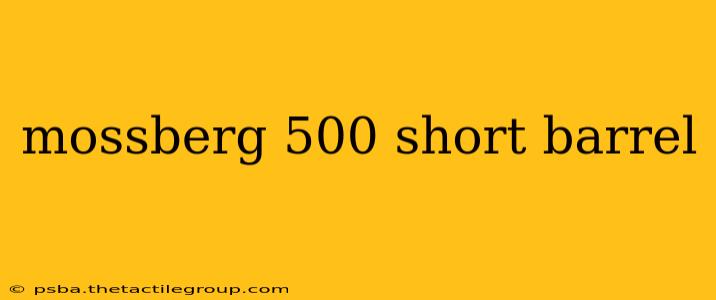The Mossberg 500 shotgun, a ubiquitous firearm in homes and ranges across the country, offers a level of versatility few others can match. One popular configuration, often sparking discussion, is the Mossberg 500 with a short barrel. This guide delves into the specifics of short-barreled Mossberg 500s, exploring their pros, cons, legal considerations, and ideal applications.
Understanding Short Barrel Shotguns
Before we dive into the Mossberg 500 specifically, let's define what constitutes a "short barrel." Generally, a short barrel shotgun refers to any shotgun with a barrel length shorter than 18 inches. This is a crucial distinction due to legal ramifications (more on that below). Shorter barrels offer advantages in maneuverability and close-quarters combat (CQB) situations, but they come with trade-offs in accuracy and effective range.
Mossberg 500 Short Barrel: Advantages
The Mossberg 500's reputation for reliability and affordability extends to its short-barreled variants. Here's what makes them attractive to certain users:
- Maneuverability: The reduced length makes the shotgun easier to handle in tight spaces, ideal for home defense or tactical situations. This improved maneuverability is a significant advantage in close-quarters combat where quick target acquisition is paramount.
- Compactness: A shorter barrel makes the firearm more compact for storage and transport. This is a boon for users with limited storage space or those who need to carry the shotgun discreetly.
- Weight Reduction (Slight): While not drastic, a shorter barrel does contribute to a slightly lighter overall weight, which can be beneficial for extended use.
Mossberg 500 Short Barrel: Disadvantages
While offering benefits in specific scenarios, short-barreled shotguns also present some drawbacks:
- Reduced Effective Range: The shorter barrel reduces the distance at which the shot pattern remains effective. Accuracy significantly decreases beyond a close range, limiting its usefulness for longer-distance shooting.
- Increased Recoil: While the weight reduction is minor, the shorter barrel can amplify felt recoil, making it less comfortable to shoot, especially for less experienced users.
- Increased Blast: The shorter barrel directs more of the expanding gases towards the shooter, leading to a more intense muzzle blast and potentially increased hearing damage.
Legal Considerations: NFA Regulations
This is perhaps the most critical aspect to understand. In the United States, short-barreled shotguns (SBS) are regulated under the National Firearms Act (NFA) of 1934. This means that owning and possessing an SBS requires registering it with the Bureau of Alcohol, Tobacco, Firearms and Explosives (ATF) and paying a tax stamp. Failure to comply with these regulations can lead to severe legal penalties. It is absolutely crucial to understand and comply with all applicable federal, state, and local laws regarding short-barreled shotguns before purchasing or possessing one.
Ideal Applications for a Mossberg 500 Short Barrel
Given their advantages and disadvantages, short-barreled Mossberg 500s find their niche in specific applications:
- Home Defense: The maneuverability and compact size make it suitable for close-quarters home defense scenarios.
- Tactical Applications (with proper licensing and legal compliance): Law enforcement and military personnel might utilize them in specialized CQB situations.
Conclusion: Choosing the Right Barrel Length
The decision of whether a short barrel Mossberg 500 is right for you depends heavily on your intended use and your understanding of the legal implications. If you prioritize maneuverability in close quarters, it might be a good option. However, if you need accuracy at longer ranges, a standard-length barrel would be more suitable. Always prioritize safety and legal compliance when considering any firearm purchase. Thoroughly research your local laws and regulations before making a decision.

